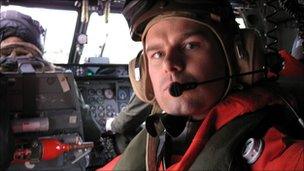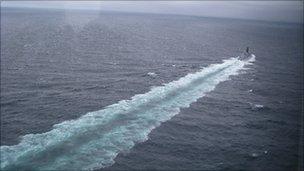On board HMS Portland as part of Armed Forces Week
- Published
HMS Portland has returned to dock in Edinburgh to showcase the navy's skills as part of Armed Forces Week
Our taxi to HMS Portland was a Royal Navy Lynx helicopter which landed neatly on the deck as the frigate ploughed through the waves off the Northumbrian coast.
The vessel is a Type 23 frigate, the mainstay of the British fleet, 133 metres long with a displacement of 4,900 tonnes.
Launched on the River Clyde in 1999 HMS Portland holds the speed record for the Duke class, at 30.8 knots, and has evolved from an anti-submarine ship into a multi-purpose fighting force.
Soon after we board, the crew are rehearsing for an attack.
In the operations room sailors, wearing white hoods and masks to protect their faces from a potential blast, are hunched quietly over monitors which glow blue, green and red in the dim light.
Suddenly, the calm is broken by the blast of a whistle and a loud shout of "0-9-0 Slotback 0-9-0."
Whether "slotback" has any relevance is unclear. One sailor tells us that sometimes, when visitors are onboard, they might shout "pineapple" in their drills, just to see the bemused look on their guests' faces.
In fact, explains Leading Seaman David Smith, the exercise is designed to simulate a missile being fired at the ship from the air.
"It was a single threat aircraft coming inbound," he tells us.
"It was flying in the sky unidentified. We investigated the contact to find out who it was. And evidently at the end it was a hostile aircraft with one single missile and we took 'em both out."
Exercise over and virtual threat eliminated, Leading Seaman Smith gives us a guided tour of his living quarters, the 30-man mess.
He shows us his three lockers, one holding his precious golf shoes, and his triple-decker bunk with fetching duvet cover in pink stripes.

HMS Portland was on exercise in the North Sea ahead of arriving in Edinburgh for Armed Forces Day
"It's not the biggest of spaces," he says "but we make it as comfortable as we can."
That becomes important on long tours of duty. HMS Portland's most recent voyage included a circumnavigation of South America, with the aid of the Panama Canal.
Commander Knott gives us a flavour of the eight month mission.
"We went down to the South Atlantic. We were protecting the Falkland Islands. We then came back through the Pacific Ocean. We did counter-narcotics operations there. And we also did some peace support operations in Africa."
But HMS Portland must prepare for war as well as peace.
As darkness falls two men rush out onto the wings of the bridge to man the weapons - a machine gun and a mini gun.
It is a big responsibility for the young sailors. Their task is to decide, in the gloom, whether their guns are trained on a terrorist target or something less sinister.
They may have just seconds to make the call.
Engaging public
In this drill the target is actually three red balloons which are soon being shredded by live rounds, lit up by tracer fire against the indigo sky.
Next morning life on board begins again at 0600 BST.
In the noise of the galley Leading Chef Thomas Dennison is frying eggs, one of three meals a day for 180 sailors.

HMS Portland was launched on the River Clyde in 1999
In the Caribbean climate it can be tough down here, he tells us, but when the ship is in colder climes the roasting hot galley is envied.
After breakfast there is a challenge of a different sort. Every member of the crew must look their best as they sail in to Edinburgh.
Buttons and shoes are polished. Hats are straightened and the crew march on deck as the ship glides into Leith with the aid of two tugs.
HMS Portland is here for Armed Forces Day - a chance to engage with the public rather than the enemy.
The force that once ruled the waves may be shrinking. There may be tough missions for the Royal Navy in Afghanistan and Libya.
But for the crew of HMS Portland it all means they are busier than they have been for years.
- Published24 June 2011
- Published24 June 2011